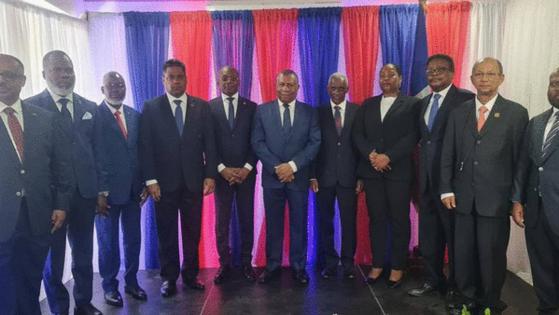Trying to avert crisis, Haiti's presidential council makes concessions to minority bloc
Published in News & Features
Haiti’s new transitional presidential council, already mired in controversy over the way it has made key decisions, is once more doing an about-face. This time it’s over how many votes will be needed to make important decisions such as selecting the country’s next prime minister, and who among them should be in charge of coordinating priorities, signing accords and meeting with foreign dignitaries.
The decision comes amid an internal crisis that risks the council’s unraveling and has led to tense negotiations over the past week. As a result, the majority of the council’s seven-voting members has agreed to invalidate the choice of Edgard Leblanc Fils as president of the council, and institute, instead a rotating presidency among four of them, several people with knowledge of the council’s workings have told the Miami Herald.
The council has also agreed that it will take a super-majority of five of the seven voting members to make decisions when a consensus can’t be reached on major decisions. A document finalizing the new agreement is expected to be signed Wednesday.
The reversal arose after a crisis of the group’s own making when its first major decision after being installed, electing a president among their seven voting members, led to controversy and nearly the council’s implosion. Last week, after summoning journalists to witness a public vote on the election of the group’s leader, the council then announced that such a vote would no longer be needed. An “Indissoluble majority bloc” made up of four members had decided among themselves to choose Leblanc, a former president of the Haitian Senate and candidate for president of the republic.
The new so-called “unbreakable” political alliance had also decided, in violation of their own procedures, who should replace the former prime minister, Ariel Henry. They designated a former minister of youth and sports, Fritz Bélizaire.
The announcements immediately plunged the group into controversy. The three members of the minority bloc accused the other four, along with the four sectors of Haitian society that had named them, of violating the April 3 political accord they all signed, and which dictates how they should function. Others accused the majority bloc and the political party leaders aligned with them of cutting a backroom deal to control important government ministries with the goal of lining their pockets and taking charge of the electoral machinery ahead of general elections. The elections, which have not yet been scheduled, is among the measures the council will be tasked with organizing.
The latest reversal marks the second time in less than a week the group has changed its mind. Last week, the majority bloc announced that members would return to their original political agreement to choose a prime minister from a pool of applicants, and have since been accepting applications.
But the conflict within the council has led to lost time while adding to doubts about whether the formula of a multi-headed executive will work in Haiti, and whether the group can put aside self-interest and political rivalries to address the various crises confronting Haiti. The country has not seen a commercial flight land at it main seaport since March 4 and is facing deepening hunger amid skyrocketing prices, a closed government seaport and gang-controlled roads blocking goods from moving.
“The members of the presidential council have the heavy responsibility of leading this transition and demonstrating good governance and transparency in their decisions in order to restore confidence among the population in their leaders and elites,” a network of Haitian civil society associations and organizations said in a statement.
Since March 11 when Caribbean leaders, meeting in Jamaica, helped brokered a deal to set up the presidential council, members have struggled to gain their footing and accomplished little. They’ve managed to get sworn-in and meet with the head of the police and army. This week they also decided to write to Kenya President William Ruto asking for the deployment of his police officers to lead the Multinational Security Support mission to help Haitian police battle gangs.
Most of their time, however, has been consumed with addressing internal differences and negotiating to avoid unraveling. As a result of the friction, there has been little time to meet with the outgoing cabinet, or to renew a state of emergency that was instituted after armed groups launched coordinated attacks in late February against key infrastructure in hopes of bringing down the government.
On Tuesday, the United Nations noted that two months into the coordinated attacks, Haiti continues to be affected by multiple crises. In the north of the country recent floods and landslides have led to the deaths of at least 17 people and flooded more than 4,000 homes, while in the capital, the population continues to flee their homes.. More than 90,000 people have been forced out of their home in recent weeks in Port-au-Prince and into makeshift encampments.
In a statement related to the violence in the capital, the U.N. Humanitarian Coordinator for Haiti, Bruno Maes, this week strongly condemned the humanitarian impact of the repeated attacks in the Solino neighborhood and the surrounding areas of Port-au-Prince.
“The siege of the civilian population in Solino, including women, children and men who find themselves without access to water, food and fuel, is a blatant violation of the basic humanitarian norms,” Maes said, urging gang leaders to stop the attacks “so that the population can live without fear in their homes, in complete safety, and so humanitarian actors can assist those affected.”
©2024 Miami Herald. Visit at miamiherald.com. Distributed by Tribune Content Agency, LLC.







Comments